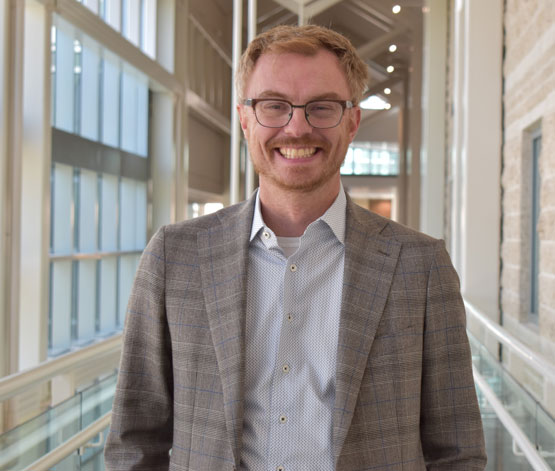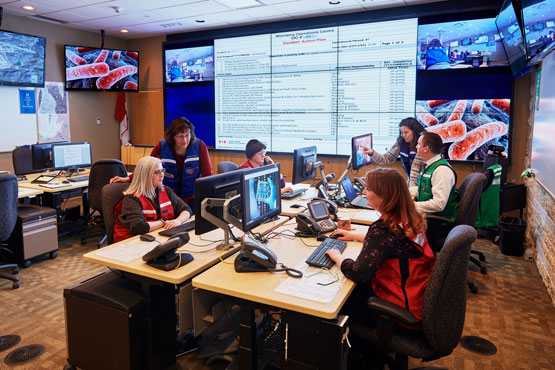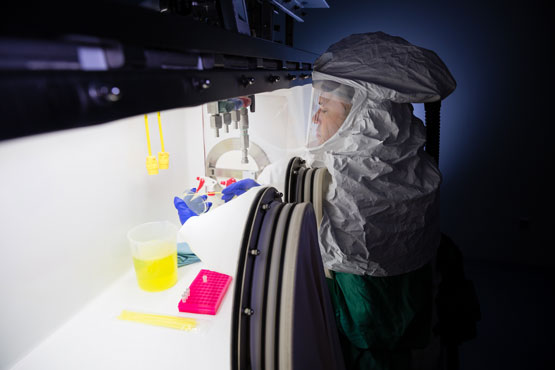January 18, 2024
Dr. Guillaume Poliquin, Vice-President of the Public Health Agency of Canada’s (PHAC) National Microbiology Laboratory (NML), has been interested in science for as long as he can remember. But he never thought it would one day lead him to lead a world class infectious disease laboratory. He recalls, after moving to Winnipeg in 2008, catching a glimpse of the building and commenting to his wife, “wouldn’t it be cool to work there for a couple of weeks and see all the neat stuff that happens?”
From PhD student to Vice-President

Dr. Guillaume Poliquin, Vice President of the National Microbiology Laboratory.
Dr. Poliquin, a pediatric infectious disease doctor and Assistant Professor at the University of Manitoba, came to Winnipeg after receiving his medical degree from Western University to complete his clinical training at Manitoba’s Health Sciences Centre. At the time, he was also looking to pursue scientific research to complement his clinical work.
One day, while grabbing a coffee during an on-call shift, Dr. Poliquin ran into fellow pediatrician Dr. Jim Strong, Head of Diagnostics & Therapeutics for the Special Pathogens Program at the NML. Dr. Strong asked him if he was interested in doing PhD research at the lab. Thus began Dr. Poliquin’s career at the NML, studying the impacts of intensive care supportive treatments in a model of Ebola virus disease. Long fascinated by “the interplay between science and medicine,” the project was a perfect fit for Dr. Poliquin. During this time at the lab, he deployed to West Africa to help respond to the 2013-2016 Ebola outbreak.
In 2015, Dr. Poliquin took on the role of NML’s senior medical advisor. He became involved in various projects and gained a vantage point to see the full extent of the work happening across the lab. In 2020, he set his research aside to focus on the COVID-19 response. In May 2020, Dr. Poliquin stepped into the head role at the lab.
Major accomplishments during COVID-19
Dr. Poliquin describes his first months leading the lab as helping channel boundless energy and enthusiasm from employees to where it would be most impactful. He witnessed how science moved along at a rapid pace to keep up with the demands of the pandemic, noting that one of the NML’s strengths is its ability to swiftly pivot in response to crises or pressing needs. Not only was the lab running diagnostics, but it also quickly established programs to monitor for COVID-19 variants and set up a nation-wide wastewater surveillance network.

The NML’s Emergency Operations Centre, which activates during high-risk events such as the COVID-19 pandemic.
“Taking stock of what was accomplished is sometimes bewildering,” says Dr. Poliquin. “Things that might not have been realized in the span of a career were done in months, thanks to everyone rolling up their sleeves and diving full steam ahead.”
Dr. Poliquin is now working out how to use the lessons learned from the COVID-19 pandemic and integrate these programs into daily operations in a way that’s sustainable for employees. There is also the matter of the many projects put to the side during the pandemic that need to be tackled—syphilis, HIV and tuberculosis numbers are rising and the impact of climate change on infectious diseases.
Getting to the next step of science
Running a world-class laboratory within a public health agency comes with all sorts of complexities. The NML, as a national reference centre, provides diagnostic and surveillance services to clients and health care providers for a range of infectious diseases. It is expected to be at the leading edge of new techniques and findings, and up-to-date on newly circulating infectious diseases. The lab also dedicates time, personnel and funding to discovery research, which encompasses everything from finding cures to diseases to evaluating how long viruses live on surfaces.

A scientist works in a high containment laboratory.
Dr. Poliquin observes that science itself is getting more complex, technologies are evolving and the expectations of people in Canada are growing. His experience working as a medical doctor, including in Manitoba’s northern and remote communities, provides insights into how the health care system functions, what inequities to laboratory services exist, and how the NML can provide support to people in Canada.
“It’s a question of identifying what is affecting the health of Canadians today and tomorrow and making sure we’re ready to improve health outcomes through laboratory science,” says Dr. Poliquin.
In forging a path forward, Dr. Poliquin seeks to identify opportunities and facilitate scientific work, while also recognizing the importance of employee wellness and research excellence. The NML became its own branch within PHAC in 2021, recognizing its importance to the organization and to science throughout Canada . Dr. Poliquin intends to further establish the NML as an attractive research partner in Canada and abroad with both government public health organizations and academia.
“Science is at its best when it’s collaborative,” he says. “My role is to help build bridges that foster great ideas and great talent at the lab.”
For Dr. Poliquin, the people are the “essential secret ingredient” in the NML’s many achievements—from world-leading scientists across multiple disciplines in infectious diseases to the leaders in the technologies, such as genomics, that support research, to the support staff who keep the place running.
“Anticipating and getting to the next step of science is part of the fabric of the place,” he says. “There’s no resting on laurels. There’s always a drive to figure out what needs to be learned, studied and delivered.”
